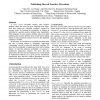Free Online Productivity Tools
i2Speak
i2Symbol
i2OCR
iTex2Img
iWeb2Print
iWeb2Shot
i2Type
iPdf2Split
iPdf2Merge
i2Bopomofo
i2Arabic
i2Style
i2Image
i2PDF
iLatex2Rtf
Sci2ools
SDM
2010
SIAM
2010
SIAM
Publishing Skewed Sensitive Microdata
A highly skewed microdata contains some sensitive attribute values that occur far more frequently than others. Such data violates the "eligibility condition" assumed by existing works for limiting the probability of linking an individual to a specific sensitive attribute value. Specifically, if the frequency of some sensitive attribute value is too high, publishing the sensitive attribute alone would lead to linking attacks. In many practical scenarios, however, this eligibility condition is violated. In this paper, we consider how to publish microdata under this case. A natural solution is "minimally" suppressing "dominating" records to restore the eligibility condition. We show that the minimality of suppression may lead to linking attacks. To limit the inference probability, we propose a randomized suppression solution. We show that this approach has the least expected suppression in a large family of randomized solutions, for a given privacy requireme...
Data Mining | Eligibility Condition | SDM 2010 | Sensitive Attribute Value | Specific Sensitive Attribute |
Related Content
| Added | 29 Oct 2010 |
| Updated | 29 Oct 2010 |
| Type | Conference |
| Year | 2010 |
| Where | SDM |
| Authors | Yabo Xu, Ke Wang, Ada Wai-Chee Fu, Raymond Chi-Wing Wong |
Comments (0)

